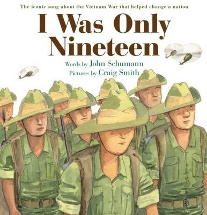I was Only Nineteen by John Schuman

Ill. by Craig Smith. Allen & Unwin, 2014. ISBN 9781743317235.
The banner across the top of the cover of this book says, 'The
iconic song about the Vietnam War that helped change a nation' and
indeed, anyone who has heard the original with the haunting voice of
John Schuman as the lead singer of Redgum will find that echoing in
their head as they 'read' this picture book version of the song that
brought the realities of the war to a generation. If you are
unfamiliar with it, it's available on You Tube .
While, for the first time in history, war was brought into the
family living room through the immediacy of television news
programs, it was the personalising of what was happening through the
lyrics of this song that not only provided a real insight but which
has also endured. In fact, along with the picture
of the little girl running naked from her village after it had been
destroyed with napalm bombs it would be one of the most-recalled
memories of that time. It's refrain and final line, 'God help me, I
was only nineteen' encapsulates it all. Both the words and the
sensitive, evocative images of Craig Smith show that war is the
antithesis of the great adventure that these soldiers' ancestors
thought that it would be as they hastened to answer the call of 1914
and which will be in our thoughts as we move towards the
commemoration of ANZAC Day.
But this is much more than another picture book about Australia's
war effort to support the national history curriculum.
As one of those who was very much involved in the events of the time
and worked towards the big-picture objectives of not only having
Australia and New Zealand troops out of Vietnam because we were
against the 'all-the-way-with-LBJ' policies of the prevailing
governments but also against sending young men to war who, in their
own country could not vote or legally have a beer, we did not
consider or understand the effects our actions would have on those
young men when they eventually came home, mentally and physically
wounded, and to have served in Vietnam was a secret and a shame.
There were no parades or celebrations - you might talk about it with
your mates to keep you sane but that was all. There was no respect
from the public and each soldier was somehow held personally
responsible for the events which we saw each night. (If you, as an
adult, want a greater understanding, read Well Done, Those Men
by Barry Heard and Smoky Joe's Cafe by Bryce Courtenay.)
And so we have the situation today that many of our students have
grandparents who are perhaps not as they should be and cannot
explain why. They saw and did things that no 19-year-olds should
ever have to and it is their experiences, their illnesses, their
PTSD, their suicides that have changed the way we now view our
serving forces and how they are treated and supported when they come
home. The picture books and television shows always stereotype
Grandpa as being loving and jovial and every child deserves such a
person - the production of this book might help them understand why
theirs is not. It has an important role to play in helping our
little ones understand.
If just the lyrics or the clip of the original 'I was Only 19' were
the only ones used in a study of the Vietnam War, the story would
not be complete. It is through Craig Smith's final illustrations of
the young soldier now a grandfather with his grandson ducking from a
chopper, then sharing an ice cream and finally marching on ANZAC Day
together that are critical because they show that while he is still
troubled by his experiences, he has survived and 40 years on society
has moved on to a new and different attitude. For that we have to
thank the continued and sustained efforts of all those Vietnam Vets
who would not let us forget. We salute you now as we should have
then.
For those who see this as a teaching opportunity, there are
teachers' notes available.
Barbara Braxton